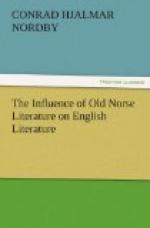He knows how Iceland touched England, as this passage will show: “That the Icelandic bards were common in England during the Danish invasions, there are numerous proofs. Egill, a celebrated Icelandic poet, having murthered the son and many of the friends of Eric Blodaxe, king of Denmark or Norway, then residing in Northumberland, and which he had just conquered, procured a pardon by singing before the king, at the command of his queen Gunhilde, an extemporaneous ode. Egill compliments the king, who probably was his patron, with the appellation of the English chief. ’I offer my freight to the king. I owe a poem for my ransom. I present to the ENGLISH CHIEF the mead of Odin.’ Afterwards he calls this Danish conqueror the commander of the Scottish fleet. ’The commander of the Scottish fleet fattened the ravenous birds. The sister of Nera (Death) trampled on the foe: she trampled on the evening food of the eagle.’”
So wide a knowledge and so keen an appreciation of Old Norse in a Warton, whose interest was chiefly elsewhere, argues for a spreading popularity of the ancient literature. Thus far, only Gray has made living English literature out of these old stories, and he only two short poems. There were other attempts to achieve poetic success with this foreign material, but a hundred exacting years have covered them with oblivion.
DRAKE (1766-1836). MATHIAS (1754-1835).
In the second decade of the nineteenth century, Nathan Drake, M.D., made a strong effort to popularize Norse mythology and literature. The fourth edition of his work entitled Literary Hours (London, 1820) contains[11] an appreciative article on the subject, the fullness of which is indicated in these words from p. 309:
“The most striking and characteristic parts of the Scandinavian mythology, together with no inconsiderable portion of the manners and customs of our northern ancestors, have now passed before the reader; their theology, warfare, and poetry, their gallantry, religious rites, and superstitions, have been separately, and, I trust, distinctly reviewed.”
The essay is written in an easy style that doubtless gained for it many readers. All the available knowledge of the subject was used, and a clearer view of it was presented than had been obtainable in Percy’s “Mallet.” The author was a thoughtful man, able to detect errors in Warton and Percy, but his zeal in his enterprise led him to praise versifiers inordinately that had used the “Gothic fables.” He quotes liberally from writers whose books are not to be had in this country, and certainly the uninspired verses merit the neglect that this fact indicates. He calls Sayers’ pen “masterly” that wrote these lines:
Coucher of the ponderous spear,
Thou shout’st
amid the battle’s stound—
The armed Sisters hear,
Viewless hurrying
o’er the ground
They strike the destin’d
chiefs and call them to the skies.




